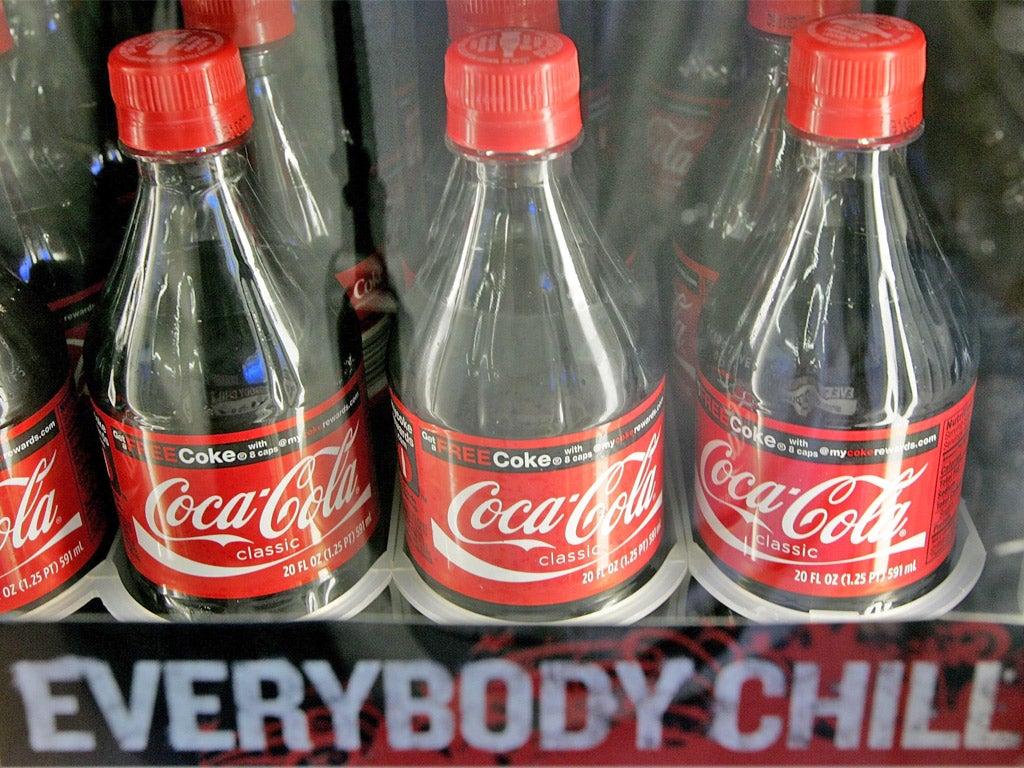Sponsors urged to waive Olympic tax breaks worth tens of millions
After McDonald's and Coca-Cola bow to online pressure, campaigners insist others must follow

Corporate sponsors of the London Olympics, who could make hundreds of millions of pounds from sales and publicity linked to the Games, are coming under increasing pressure to turn down generous tax exemptions granted by the Government.
Coca-Cola, which has a monopoly on soft drink sales at the Olympic Park in east London, followed fellow sponsor McDonald's yesterday by saying it would decline the tax break. Campaigners claim the exemptions are worth tens of millions of pounds to the corporations whose logos are plastered across Games venues.
Other non-UK Olympics sponsors including Visa, the electronics conglomerates Samsung and Panasonic, and the American chemicals giant Dow were urged to follow suit and formally announce they will pay full corporation and income tax on their earnings from the Games.
The Olympic Park is dotted with sales points and shops selling goods – from soft drinks to tablet computers – offered by sponsors, who are protected by stringent marketing rules.
An online petition calling on sponsors to decline the exemptions had gathered more than 160,000 signatures yesterday after campaigners said the tax breaks in effect treated Olympic venues like "offshore havens".
The exemptions were granted by HMRC as part of a package of concessions demanded by the International Olympic Committee. They apply to corporation and income tax for non-UK companies and individuals working on the Olympics between 30 March and 8 November this year.
HMRC said British taxpayers were not losing out because London would not have won the bid to host the Games without meeting the committee's demands.
But critics said the measures allow companies linked to or sponsoring the Games to save millions by using corporate subsidiaries registered outside the UK. The tax break also applies to competitors and their multimillion-pound endorsement deals.
Richard Murphy, director of Tax Research UK, said the loss of income to the Treasury from revenues generated by the 5.5 million expected visitors to the £11bn Olympics would run into tens of millions of pounds.
"The Olympics was founded on an ideal of participation. Tax is based on the same ideal – that we all play our part. This exemption undermines that ideal and puts the Olympics outside the society that has given enormously to host the Games," he said. "We're giving away money that we need to solve our debt crisis and to preserve essential public services."
McDonald's, which expects to sell £3m of food at its 1,500-seat Olympics restaurant (its biggest in the world), acknowledged that the cost of turning down the exemption would be minimal since its revenues from the Games would be less than 0.1 per cent of its annual UK sales.
Coca-Cola pointed out that 90 per cent of its Olympics staff are UK nationals, while General Electric said all of its projects associated with the Olympics were undertaken by its UK companies and were subject to normal tax rules.
Adidas and BMW, which have secured respective deals to supply clothing to British competitors and cars to transport Olympics officials, said the exemptions did not apply to them. Procter & Gamble, Omega and Atos also said the exemptions did not apply because they were not selling items at the Olympics.
Visa and Dow declined to comment. Samsung, Panasonic and computer company Acer did not respond to requests to comment.
Tax in brief: How the exemptions work
The London 2012 tax exemptions granted by HMRC are part of a package of concessions required by the International Olympic Committee (IOC). They also include the provision of 500 chauffeur-driven cars and 40,000 hotel rooms.
The tax breaks, which will apply for seven months, remove the requirement to pay corporation tax and income tax for "non-resident" companies and individuals who take part in "Games-related activities" or provide services to London 2012.
Thus non-UK sponsors and individuals, from athletes to visiting journalists, will not have to pay tax while involved in the Olympics. Nor will the Swiss-based IOC, which is set to earn £2.7bn from the Games.
Subscribe to Independent Premium to bookmark this article
Want to bookmark your favourite articles and stories to read or reference later? Start your Independent Premium subscription today.

Join our commenting forum
Join thought-provoking conversations, follow other Independent readers and see their replies